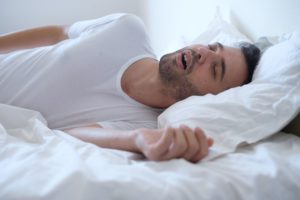Do you ever wake with a scratchy, swollen throat when it’s not allergy season? Do you wake up feeling not fully rested even though you got enough sleep?
While there can be any number of reasons that you don’t feel rested enough, you could be snoring at night, which will affect your sleep health. Other than just making noises while you sleep, snoring can influence much more than just your sinuses.
Snoring affects your whole body whether you realize it or not. From a sore throat to lack of proper breathing, snoring can take a toll on your body.
If your snoring is severe, you could stop breathing at some points during your sleep. This is a sign of an airway obstruction or sleep apnea. Symptoms of sleep apnea can be dangerous if not treated.
Since the effects of snoring or sleep apnea can cause long-term issues, you should seek advice from a medical professional. You can schedule a sleep study to assess your issues, which doctors recommend.
You can also get help from what may be an unlikely source. If you need help with your snoring and sleep health, you could always ask your dentist.

How Can a Dentist Help?
It may seem strange to think of a dentist when you have issues with snoring or sleeping, but dentists have a unique perspective to offer. Dentists are not just trained to identify and fix issues with your teeth; they are also experts on the throat and airways.
Dentistry focuses on all areas of the mouth, face, jaw, and airway since all of these issues connect and influence one another. There are symptoms of snoring and possibly sleep apnea that a dentist can identify by a simple physical examination of your throat.
What Symptoms Should I Look For?
Symptoms of sleep apnea can vary from person to person. Just because you snore, it doesn’t necessarily mean that you also have sleep apnea. There are certain overlapping symptoms that could indicate you might have sleep apnea and need to seek treatment.
Waking with a dry mouth, sore or scratchy throat, or possibly even a headache could be a symptom of sleep apnea. When you snore for a good portion of the night, your mouth will be open, so it can’t stay moist.
As you snore, you irritate your tonsils and the soft palate and tissues in your throat. While it is not necessarily known why snoring or sleep apnea causes headaches, it could be from the body not getting the proper amount of oxygen through the night or from a lack of restful sleep.
Very loud snoring, enough to wake yourself of another person, could possibly mean sleep apnea. You may even wake up during the night with a gasping sensation. This could mean that your body was not receiving enough oxygen. So it forced you to wake up in order to continue functioning normally. It is important to note that untreated sleep apnea can cause a variety of problems for your body including a weakened immune system, heart problems, and even death.
What Are My Treatment Options?
There are also alternative treatment options that are offered by dentists when it comes to treating or controlling your symptoms. A dentist will probably suggest a sleep study to be sure of their diagnosis.
One common way to treat sleep apnea is with a CPAP machine, which is a device that ensures airflow through your nose and keeps your airway open. A dentist may offer you oral appliance therapy: a small, minimally invasive piece of equipment like a mouth guard that keeps your airway open throughout the night.
